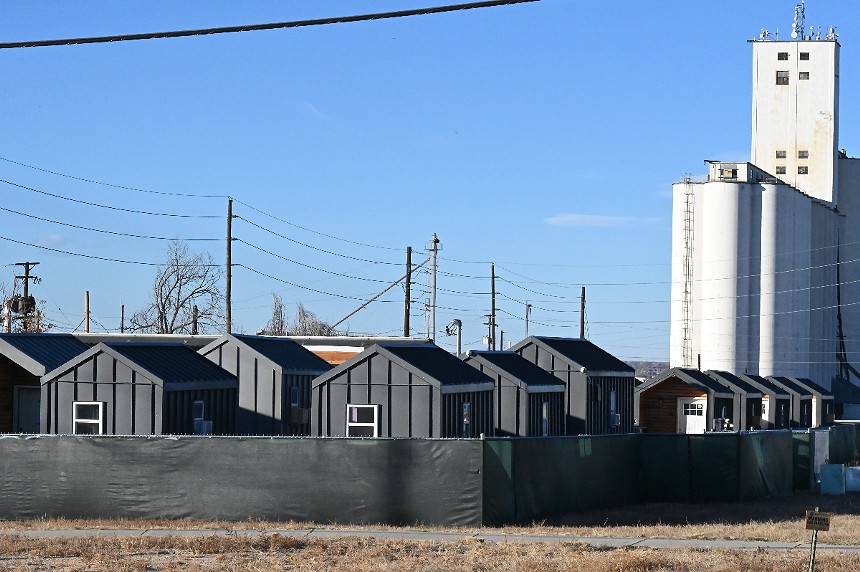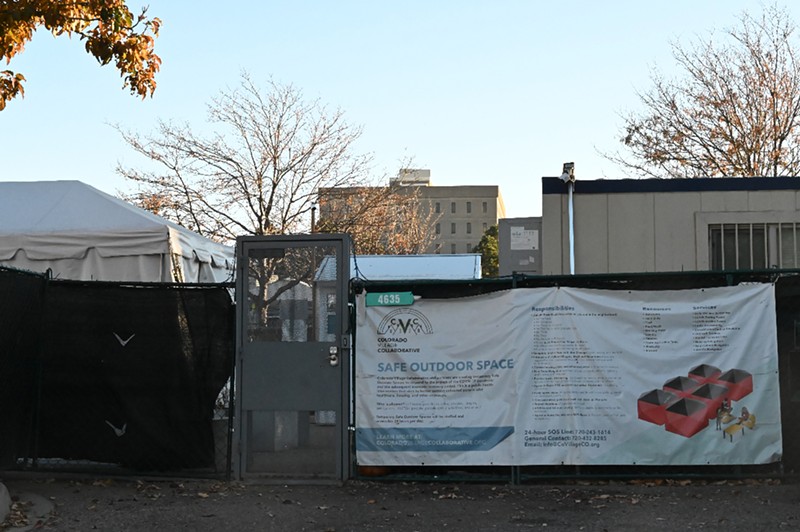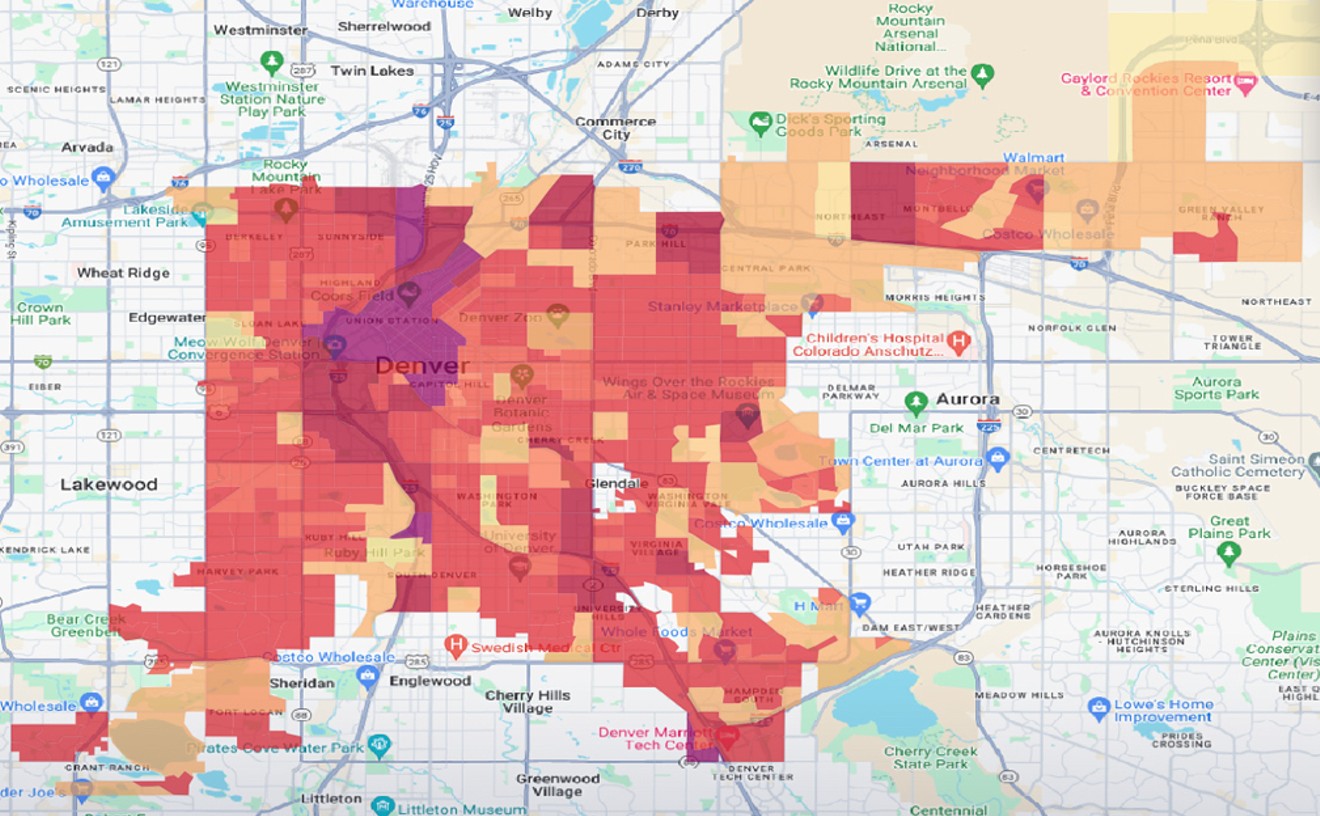Founded in 2017, CVC has provided living spaces to about 1,000 homeless people in Denver through its Tiny Home Villages and Safe Outdoor Spaces (SOS) . Tiny Home Villages are micro-communities of about a dozen shed-like units for people transitioning from homelessness to stable housing, while SOS sites are larger, fenced-in gatherings of tents with services to find stable housing.
The nonprofit is expanding two Tiny Home Villages, both in Elyria-Swansea, by adding an additional five units in each. The bigger project, however, is replacing the tents at an SOS site with shed-like Pallet shelters and installing plumbing in those new units.
The 41-unit SOS site is in the Clayton neighborhood, near the Denver Human Services (DHS) East offices. Elizabeth Szewczyk, the director of development and communications for CVC, says that the Pallet upgrades in Montbello will turn the site into a micro-community with a capacity for 51 residents.
Szewczyk says that "the timing of the move was aligned with the City's process for upgrading" nearby DHS offices. After the DHS's permits to start construction were approved, the city added CVC's additions into that project timeline, she says.
"This is a planned expansion. The city saw an opportunity for a more comprehensive infrastructure upgrade aligned with the micro-community model, and we are pleased to collaborate with them," she says. "Ultimately, these changes will bring improvised hygiene facilities, internet, site infrastructure like fencing, and, of course, more dignified shelter units."
"This is a planned expansion. The city saw an opportunity for a more comprehensive infrastructure upgrade aligned with the micro-community model, and we are pleased to collaborate with them," she says. "Ultimately, these changes will bring improvised hygiene facilities, internet, site infrastructure like fencing, and, of course, more dignified shelter units."
Colorado Village Collaborative has permanently closed a SOS site in Montbello near 46th Avenue and Peoria Street, near the Arie P. Taylor Municipal Center. The Montbello site is one of the few Native American inclusive sites in Denver, but it isn't large enough to fit a Pallet shelter upgrade and its zoning permit will expire early in the fall, according to Szewczyk.
After the Montbello closure, CVC is left with one SOS, on 13th Avenue in La Alma, which is also Native American inclusive.
Advocates and residents asked city leaders for an inclusive site for Native Americans after a 2021 sweep of "Denver's indigenous refugee camp," the nickname for an encampment where a couple dozen homeless Native Americans lived outside the Four Winds American Indian Council community center at West Fifth Avenue and Bannock Street.
Former Mayor Michael Hancock's administration responded by funding the creation of a SOS site by CVC in the La Alma neighborhood on Eighth Avenue and Elati Street. That site closed for a couple months after a fire in September 2022; CVC moved the SOS site to Montbello the next year after its lease with Denver Health for the location expired.

Beloved Village at 4201 Monroe Street, one of Colorado Village Collaborative's Tiny Home Villages.
Bennito L. Kelty
Residents were notified on Friday, July 26 about the closure and had until Wednesday, July 31 to leave, according to CVC. Espinoza says she was kicked out a couple weeks before the closure was announced, however.
"Over the last couple months, more and more residents were displaced on unfair accusations and circumstances...myself and so many others are shaken and disturbed about how all of this was handled," she says. "CVC didn't give me another place to live, I was kicked out for having belongings outside of my tent while I was cleaning...When the other residents left the camp, they were told they were being moved to other sites, and they were told there was only so much room for a certain amount of people."
Szweczyk disputes Espinoza's claims, and says no resident lost housing because of the upgrades. According to CVC, residents were moved to other sites, such as the La Paz micro-community, one of the Tiny Home Villages or to the SOS site on 13th Avenue — all of which have plenty of room, she says.
"Our staff helped community members pack, transport their belongings and pets and move into their new space," Szewczyk says. "We acknowledge that moving is not comfortable or easy for many people. We have case managers, peer support and a clinical social worker on staff to help folks through this process...No community members lost shelter, and many are upgrading from tents to Tiny Home units or the manufactured sleeping units at La Paz."
The sites are models for a controversial, taxpayer-funded set of micro-communities that Mayor Mike Johnston has used to house a couple hundred homeless residents during the past year. The founder of CVC, Cole Chandler, is now Johnston's senior advisor on homelessness resolution.
Colorado Village Collaborative started building SOS sites during the pandemic in partnership with the Denver Mayor's Office. The organization also manages one of Denver's three existing micro-communities, the 60-unit site in the La Paz neighborhood.
According to Szewczyk, the changes at the Clayton, Elyria-Swansea and Montbello sites "are a reflection of CVC’s alignment and ongoing partnership with the City and County of Denver and Mayor Johnston’s All in Mile High initiative," a citywide effort to house another 1,000 people this year.
In a recent interview with Westword, Johnston said that his plan for the year ahead includes upgrading the SOS in the city, but micro-communities are no longer as big of a focus. Early in his administration, Johnston envisioned using ten micro-communities to help move 1,000 homeless residents indoors by the end of 2023, but after nixing seven of those sites last year, he doesn't have any plans to open more in 2024. Instead, the mayor wants to support and upgrade
existing sites and hotels that where purchased by the city and converted into homeless shelters.













